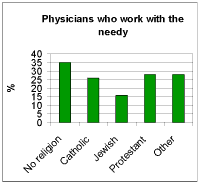 Why would anyone want to be a GP? It’s clearly a popular career choice, for reasons both selfish (high earnings and social status) and altruistic (wanting to help the sick and needy). Conventional wisdom has it that religion and altruism are connected, and there are many reasons to suppose that this might be so:
Why would anyone want to be a GP? It’s clearly a popular career choice, for reasons both selfish (high earnings and social status) and altruistic (wanting to help the sick and needy). Conventional wisdom has it that religion and altruism are connected, and there are many reasons to suppose that this might be so:
- Altruistic acts may be less altruistic for religious people (they are promised supernatural rewards, and they may also get greater payback from increased status within the community).
- There could also be self-selection – altruistic people could be more attracted by religion
- Religion is a source af altruistic ‘priming’ messages – and these can affect behaviour
- Religions also often require an individuals to make a public commitment to charity
It certainly seems that religious believers tend to give more to charity than non-believers, and they also are more likely to volunteer for charitable work. So you might expect that religious doctors would be more likely to work among the poor and needy than non-religious.
However, a study published earlier this year shows that this is not so. The data come from a survey of 1,144 US physicians, of whom 26% reported working in “underserved” communities – i.e. people who have poor access to healthcare, usually because of poverty.
This percentage was roughly constant across differing strengths of their religious beliefs, 27% of doctors with low religiosity, 22% of moderates, and 29% of the highly religious. Similarly, doctors who had no religious affiliation were just as likely to work with the undeserved (see graph).
Interestingly, the physician’s beliefs about their motivations had no effect on their actual choice of practice (for a related item, see: Are the religious more caring – or do they just think they are?):
among the subset of physicians from all specialities who reported a religious affiliation, had high intrinsic religiosity, attended religious services twice a month or more, and grew up in families that emphasized serving those with fewer resources (n = 264), 90% agreed that their religious beliefs influenced their practice of medicine, and 86% viewed their practice of medicine as a calling. The proportion who reported practice among the underserved (31%) did not differ significantly from that found among those with no religious affiliation, however (35%, P = .48).
The study did find a link between high levels of spirituality and work among the needy. But spirituality is a rather ambiguous term that can be interpreted in non-supernatural ways.
Refs:
Brooks AC. Religious Faith and Charitable Giving. Policy Review. No. 121, October & November 2003
Curlin FA, et al. Following the call: how providers make sense of their decisions to work in faith-based and secular urban community health centers. J Health Care Poor Underserved. 2006;17(4):944–957
Curlin, F., Dugdale, L., Lantos, J., & Chin, M. (2007). Do Religious Physicians Disproportionately Care for the Underserved? The Annals of Family Medicine, 5 (4), 353-360 DOI: 10.1370/afm.677














